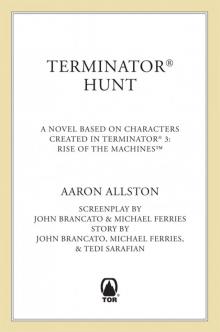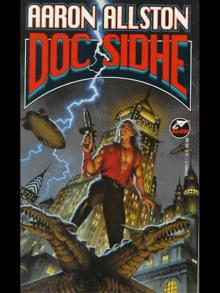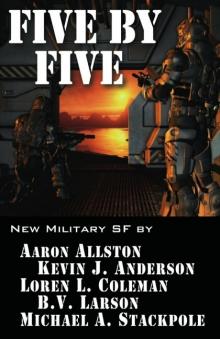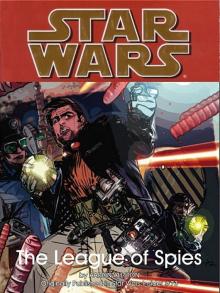- Home
- Aaron Allston
Rebel Stand: Enemy Lines II Page 10
Rebel Stand: Enemy Lines II Read online
Page 10
Baljos rose from a pile of rubbish—a collapsed desk, a toppled cabinet, a spray pattern of body parts Luke thought were more droid components until he took a closer look at them. “Fatality here,” Baljos said, his voice unusually subdued. “Human female, middle-aged, cut into about eight pieces. Lightsaber damage again, I think.” He turned away from the grisly spectacle. “Danni?”
Danni held one of her sensors in her hand. “There’s a lot of electromagnetical. From functioning equipment, I think. It’s masking any major biological energy, if there is any.”
Luke closed his eyes and extended his perceptions into the Force.
He didn’t find any signs of large living organisms. He couldn’t. As soon as he began to extend his awareness, he became aware of it, the darkness he’d detected from above. Here, it was much closer, a suffusion of anger and violent intent that threatened to make him sick to his stomach. He opened his eyes and shook his head at the other Jedi. “We search the hard way,” he said.
It was an expansive scientific complex. This floor had indeed been a scientific research station … decades in the past. Computer systems dating from before Luke’s birth lay under dust covers, and Danni identified one long-unused laboratory as being devoted to cellular analysis.
The most curious feature of the floor, however, was a chamber to one side of the laboratories. It held nothing more than a long apparatus that looked like a bed with a lid. “A hermetically sealed sleeping unit,” Bhindi suggested.
“An Imperial-era suspended animation unit,” Baljos corrected. “Later modified to be different from production units, since whatever was in it was nearly three meters tall. Not human.”
Privately, Luke disagreed. The characteristic of the chamber that many of the others couldn’t detect was that it reeked of the dark side of the Force—it was the source, or at least a source, of the disquiet he had felt. And it somehow suggested humanity to him, humanity at its worst.
There was something familiar about this darkness, familiar and ghastly. “Can you tell what it was?” Luke asked.
Baljos looked at the unit. The transparisteel cover had been thrown aside with such strength and violence that it was warped, the hinges along one side and locking latch on the other broken. The machinery that would have surrounded the sleeper like insulation was torn free from its housing and lay in pieces around the chamber. So did four medical droids—Luke thought it was four, gauging from the number of droid heads within sight, but he had to admit that their state of dismemberment made actual calculations difficult. “Depends on whether any memory survived in this machinery,” Baljos said. “More Bhindi’s department than mine. But if it did, and even if the memory doesn’t obligingly say ‘Ithorian’ or ‘wampa’ or something, I might be able to figure it out based on the settings and life-sign readings it recorded.”
Mara stuck her head in through a darkened doorway at the corner of the chamber. “Luke, this should interest you.” She tossed something toward Luke’s feet.
From the manner with which it twisted and curled as it flew, Luke suspected that it was part of an amphistaff, but when it landed at his feet, he saw that he’d been wrong. This sinuous body was covered in fur and had legs ending in needlelike claws. It had been dead for some days. “Ysalamiri,” he said.
“Your friend and mine,” Mara said. “There are pieces of a cage and some Myrkr tree limbs in here. And access halls to similar chambers at the other seven corners of the chamber. Dead ysalamiri there, too.”
“That actually makes sense.” Ysalamiri were reptilian creatures of the planet Myrkr. Generally docile, content to live on their trees, they had a trait that made them of considerable interest to Jedi and other Force-wielders: They projected a sort of energy that repelled the Force, kept its energies at bay. An ysalamiri’s projections canceled the effects of the Force out to a distance of ten meters. Those who knew their traits had used them to hide things from the Jedi, even to capture the Jedi and temporarily strip them of their powers. “If this has been here all these years, I should have felt it before now while we were living on Coruscant. But if this chamber was surrounded by ysalamiri, with their anti-Force bubbles overlapping, it would have masked the presence of whatever was here.”
“Whatever it is,” Face said. “The way I read it, this thing woke up, busted out, destroyed all the droids around it. With just its strength, you’ll notice, because there are no burn marks on the droids in here or on the suspended animation unit. When it gets into other parts of the complex, it gets its hands on a lightsaber and finishes the job. Then it destroys the other droids and the ysalamiri.”
Luke nodded. “That could be it. But how did it get out of this complex? With the ysalamiri dead, we’d feel it if it were still here.”
Minutes later, they had their answer.
Two levels above, on the floor that had been marked MAINTENANCE, Tahiri pointed upward into what had been a machinery-access niche. The metal panel that had been the niche’s ceiling was gone; the edges of the hole were burned. “This leads to a water and atmosphere supply shaft,” she said. “It has pipes in it, but also plenty of open space. I climbed up a pretty good distance; it leads up to a hole in a wall a couple of levels up from the chamber with the red goo.”
“Is the hole easy to access?” Bhindi asked.
Tahiri shook her head. “Not for normal people. It’s about five meters up on a ten-meter wall. But anybody with a ladder could get up to it.”
“Especially obvious?”
“No, it’s on one side of a storage house. Full of carpeting and wall decorations. Really useful stuff. No sign of people there. Why?”
“Because,” Bhindi said, “in addition to this mystery of a three-meter-tall whatever-it-is, we have here a complex that still has power, a complex that’s hidden from sight. It’s big enough to be the headquarters of the first resistance cell I organize.”
“Not a good idea,” Luke said. “That three-meter being knows where it is. He or she may come back.”
“So we close up its exit hole, hide it, maybe secure that approach against intrusion.” Bhindi fixed Luke with a grave look. “Besides, I suspect that you’re not going to let that thing keep walking around out there. Are you?”
“I hope not.” Luke looked up the hole; only a few meters of the water and atmosphere pipes were visible in the dim light from their glow rods. “It’s very strong, very evil. And I have no idea whether we have enough resources here to stop it.”
SIX
Vannix, Vankalay System
The tall man wrapped in a gray hooded cloak entered the shop. His face was shadowed by the hood; under the cloak his garments were plain, dark trousers and tunic of the sort that any laborer might wear. Behind him rolled a blue and white R2-class astromech.
The shop owner, an aged human man with a fringe of white hair and rheumy blue eyes, sighed. He moved his hand inconspicuously under the counter to grip the hilt of the blaser pistol holstered there. He hated clients who preferred to remain anonymous. So often they were on business that invited government scrutiny, and those were the best cases—the worst were when they were here to rob rather than employ. But this one, at least, had brought a droid, which suggested his business was actually in the shop owner’s line.
“You repair droids?” the cloaked man asked. His accent was foreign. Corellian, perhaps.
“We do,” the shop owner said. “We have cleverly concealed that information on the sign outside, the blinking apparatus that reads NINGAL’S DROID REPAIR.”
Apparently oblivious to irony, the visitor nodded. “I want this one fixed.”
“Certainly. What’s the nature of his malfunction?”
The cloaked man sighed. “He has a partner, a protocol droid, and they argue. The protocol droid apparently hacked into his speech translators and now all he does is insult. We want that programming removed. We also want his recording memory wiped. Not his other programming—just the recording memory.”
“Easily done.”
/>
“You can wipe it in such a way that what’s on it can’t ever be retrieved? Not by anyone, no matter how good?”
“Also easily done. I just have to overwrite every portion of his recording memory with something else—several times, to make sure the most sensitive retrieval equipment can’t dig underneath the new material.”
The cloaked man breathed a sigh of relief. “Good.”
The shop owner tapped the counter. “Plug in here, please.”
The astromech obligingly rolled forward. He extended his datajack arm and plugged in; a moment later, a text screen lit up on the shop owner’s countertop.
“What’s your name, little fellow?” the shop owner asked.
The words THAT’S NONE OF YOUR BUSINESS appeared on the screen. IN ANY CASE, YOUR FACIAL FEATURE SET SUGGESTS THAT YOU DO NOT HAVE THE INTELLIGENCE TO RETAIN MY NAME FOR MORE THAN A NANOSECOND. IT IS EVIDENT THAT YOU HAVE BEEN TAUGHT TO REPEAT SOUNDS YOU HAVE HEARD AND THAT YOU UNDERSTAND NEITHER THE WORDS YOU HEAR NOR THE ONES THAT EMERGE FROM YOUR MOUTH.
“I see what you mean,” the shop owner said. “Well, this is a simple task. We should be through later this afternoon.”
“Good,” the cloaked man said. He turned to leave.
“Wait a moment. How do I notify you when we’re done?”
“I’ll just return.”
“And we haven’t discussed my fee yet.”
“That’s right. I don’t have any local money.”
“I’m afraid New Republic credits are no good here.”
“I have an extra power cell for the Artoo. Fully charged.”
“If you have two, that would suffice.”
“For ‘a simple task’ you should be through with later this afternoon?”
The shop owner smiled. “Is it a new power cell?”
“Brand new. I bought it on Coruscant about a month before it fell.” The man returned to the counter and produced a standard astromech power cell from beneath his cloak. Its reflective surfaces gleamed in the shop owner’s counter light.
The shop owner picked it up, hefted it, looked at its charge indicator. “Done,” he said. “I’ll see you this afternoon.”
“Thank you.”
Two minutes after the cloaked man left, a young woman entered. She was no customer, the shop owner knew. Despite her fair hair, she seemed somehow somber, and she had the bearing of a military officer.
She displayed an identichip bearing the seal of Vannix Intelligence and put it in the countertop reader for a moment. The display took only a moment to read CONFIRMED.
“What did that man want?” she asked.
The shop owner sighed. Sometimes it was a curse, always knowing when a customer was going to cause trouble.
Senator Addath Gadan kept the smile fixed to her face. Sometimes that extra effort kept her voice similarly pleasant, similarly light. “You can’t make the rally at all?”
Leia Organa Solo’s voice sounded from her desktop comlink, just as light, just as artificial. “Not today’s. I’m sorry, Addath. Han is ill and I just feel I need to stay with him. But send me the schedule for tomorrow’s events and I should be able to make those.”
“I’ll do that. Please give him my best wishes.”
“Of course.”
Addath sat and fumed. Ill, indeed. Han Solo hadn’t been too ill to sneak out of the Presider’s residence, eluding two layers of her security before being detected and followed by the third. Any smart operative could have penetrated one or two layers from the inside out, as he did, but Solo had managed it with an R2 astromech in tow, a pretty good trick.
Not that, ultimately, it had done any good. She hit the desktop button again, and once more the conversation, copied from the R2 unit’s recording memory before it had been wiped, replayed itself.
First was Leia’s voice, a whisper: “So what’s the total?”
Han’s voice was similarly hushed. “He’s promising two squadrons of starfighters, and a light carrier to serve as their base ship.”
“I don’t know, Han. That’s selling oneself pretty cheaply.”
“We need all the military resources we can get, and he wouldn’t commit to any more than that. So I said yes. And the timetable means taking delivery soon. We’re going to have to leave.”
Leia sighed. “This is going to be a big blow to Addath.”
“I know. But survival is more important than friendship.”
Addath switched it off. Anger made her feel tight from head to foot.
It wasn’t Leia turning against her that angered her. That was just politics. It was the fact that it might have worked. If she hadn’t had enough layers of security for one of them to keep track of Han’s movements, this deal between the Solos and the admiral might have come to pass, and she’d have missed her chance—her opportunity to come up with a more formidable counterbribe.
They walked alone on the lengthy balcony at the rear of the Presider’s residence. Addath had arranged for it to be cleared of all visitors, of all government employees, for this meeting. Now Leia walked along beside her, with Han, wrapped up in his hooded cloak and anonymous as any bodyguard or servant, a step behind them.
Truth be told, Addath preferred it that way. There should never be any question that Han Solo, regardless of his comparative fame, ranked lower than she did.
“I have come to make you an offer,” Addath said. “Something to help motivate your participation in my campaign.”
Leia hesitated. “About that … Addath, I won’t be able to help. Circumstances have changed. Han and I have to return to Borleias immediately. We’ll be leaving tonight.”
“Bear with me. I think what I have to offer will change your mind. I think you’ll want to stay.”
“I … well, let’s hear it.”
“Six squadrons of improved A-Nine Vigilance Interceptors and a Nebulon-B frigate refitted to carry them all—it’s more of a light carrier than it is a frigate. Vessels like it form the backbone of our new fleet.”
“Impressive. And you’d give me all this just to keep me here, campaigning for you?”
“Yes. I think that highly of your influence.”
“But Addath, you aren’t in possession of those vehicles. Admiral Werl is.”
“Until I win this election, that is. At which time I take control of the military and can simply detach those units from the navy. We won’t need them anyway. We’ll be pursuing nonviolence pacts with the Yuuzhan Vong.”
Leia sighed. “Listen, Addath, you might lose this election even with my participation. Or there might be another runoff. Or some enemy of your politics might arrange for you to be killed. There are a thousand different things that could pop up to keep you from providing us with those resources. I have to refuse.”
“What if I obtained them for you now?”
“How?”
Addath slipped a data card from her sleeve and held it up. It glinted in the moonlight. “This card holds access and authorization codes, plus a temporary military rank for the bearer. It will allow you to enter Vanstar Military Base, catch a shuttle to any of our new frigates, and assume command of it. For whatever purpose you want. Send it straight to Borleias.”
“Addath, you’re talking about taking control of military resources you don’t have legal control over.”
“But I will. A little alteration of documentation, and the dates for the transfer of ownership and control are moved up to one day after I assume the Presider’s office.”
“That’s just wrong, Addath. I can’t do that. I don’t think I can support you in this campaign at all.”
Addath blinked at her. “Leia, you surprise me. I doubt your husband is so dainty.” She turned back to the cloaked figure. “What do you say, Han?”
“Han has nothing to say about this.”
“Perhaps you should let him speak for himself.”
“I would if he were here.”
“What?” Addath felt a jolt of coldness spread through her. She looked again at t
he tall cloaked figure. “Who’s this, then? Your bodyguard?”
“Addath, I can’t exactly introduce you to Fasald Ghem. I understand you already know her.”
That coldness reached to every one of Addath’s fingers and toes as the cloaked figure threw back the cloak hood. The gesture revealed the face of a tall, lean woman, dark-haired, dark-eyed. On her forehead was a device shaped like a crown, but instead of featuring a central gem, it carried a central lens—it was a head-mounted holocam favored by some field recorders.
Addath had known her face for years. It belonged to one of the preeminent investigative holojournalists on the world of Vannix, and she stared at Addath without mercy. “Hello, Senator.”
Leia said, “Fasald, perhaps you could give us a few moments alone.”
“Of course.” The broadcaster gave Addath a perfunctory nod, then turned away.
Addath opened her mouth wide and drew in a deep breath of air, but Leia placed a finger over Addath’s lips. “Don’t do it, Addath. Don’t call for your guards. Fasald has already broadcast that entire recording to an editing station. You’d inconvenience her, you’d inconvenience me, but you wouldn’t prevent your arrest.”
Addath sighed out nearly the entire lungful. “Leia, why did you do this?”
“Don’t play innocent with me. It’s because I’m certain that your way of dealing with the Yuuzhan Vong will result in more deaths, more tragedy than my way. So I’ve stopped you.”
“You have a ruthless streak I never appreciated in you.”
“It came out when circumstances started killing my children.”
“So. What options do you leave me with?”
“You have two options. You can stay on Vannix, and within the next three hours Fasald will broadcast her report. Dealing with subsequent arrest and mobs is up to you. Or you can flee the residence and find yourself passage offworld by dawn. In which case Fasald will give you a full day to get to freedom, then broadcast her report. Either way, she broadcasts. I couldn’t persuade her otherwise.” Leia plucked the data card from Addath’s fingers. “I’ll get this back to the admiral.”

 Terminator 3--Terminator Hunt
Terminator 3--Terminator Hunt Mercy Kil
Mercy Kil Doc Sidhe
Doc Sidhe Star Wars: Fate of the Jedi: Outcast
Star Wars: Fate of the Jedi: Outcast Fate of the Jedi: Backlash
Fate of the Jedi: Backlash Mercy Kill
Mercy Kill Rebel Stand
Rebel Stand Wraith Squadron
Wraith Squadron Star Wars: X-Wing VII: Solo Command
Star Wars: X-Wing VII: Solo Command Five by Five
Five by Five Solo Command
Solo Command Star Wars: The Clone Wars Short Stories: The League of Spies
Star Wars: The Clone Wars Short Stories: The League of Spies Sidhe-Devil
Sidhe-Devil Star Wars: Legacy of the Force: Fury
Star Wars: Legacy of the Force: Fury Starfighters of Adumar
Starfighters of Adumar Star Wars: X-Wing VI: Iron Fist
Star Wars: X-Wing VI: Iron Fist Star Wars - X-Wing - Iron Fist
Star Wars - X-Wing - Iron Fist Exile
Exile Star Wars: X-Wing V: Wraith Squadron
Star Wars: X-Wing V: Wraith Squadron Star Wars - X-Wing - Starfighters of Adumar
Star Wars - X-Wing - Starfighters of Adumar Rebel Stand: Enemy Lines II
Rebel Stand: Enemy Lines II Rebel Dream: Enemy Lines I
Rebel Dream: Enemy Lines I Outcast
Outcast Star Wars - X-Wing 07 - Solo Command
Star Wars - X-Wing 07 - Solo Command